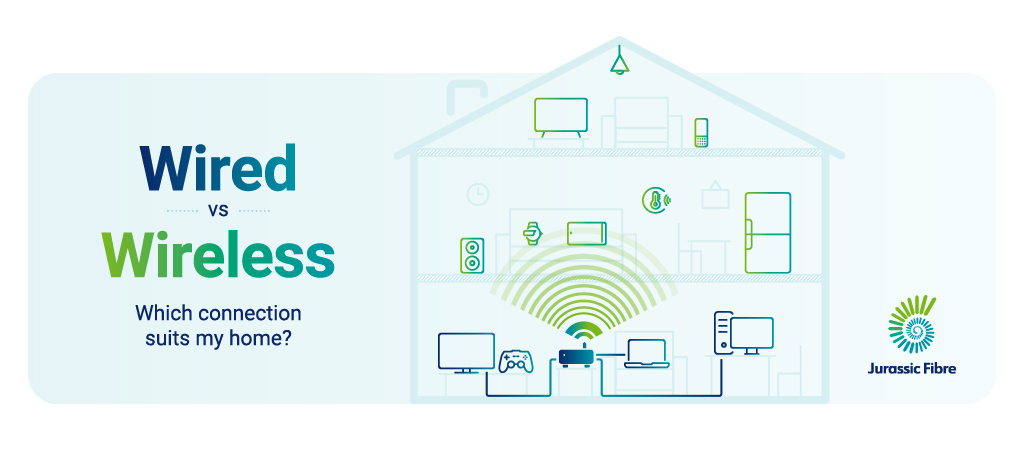
Insights
Wired Vs Wireless Broadband: Which connection suits my home?
In today’s fast-paced world, a stable and reliable internet connection at home is vital for our daily lives. When setting up your home network, you’re faced with the decision of whether to opt for a wired or wireless connection. To help you make an informed choice, let’s explore the benefits, and reasons why people prefer each option.

What is a wired broadband connection?
A wired connection refers to the use of physical cables, such as Ethernet cables, to connect your devices directly to a modem or router. It provides a direct and secure link between your device and the network and typically offers faster and more reliable speeds than a Wi-Fi connection.
What are the benefits of a wired connection?
Speed and reliability
Wired connections usually offer faster, and more consistent internet speeds compared to wireless. This makes them ideal for activities that require high bandwidth, such as online gaming, streaming 4K videos, downloading large files or multiple video calls with family or work.
Reduced latency
With lower latency, wired connections provide a smoother and more responsive online experience, especially for online gaming or real-time video conferencing.
Security
Wired connections are less vulnerable to external threats as they require physical access to the network. This makes it more challenging for potential hackers to breach your system.
Why do people prefer wired connections?
A wired connection may be the best option for devices that need high-speed, consistent internet connections and homes that need to capitalise on high download speeds.
Performance-oriented users
Gamers, content creators, and professionals dealing with large file sizes who rely on high-speed and low-latency connections often prefer wired setups to ensure optimal performance and consistent connectivity to their network.

Stability
Wired connections offer a stable and consistent internet experience without fluctuations and signal interference which can cause drops or slowdowns if they are on a wireless connection.
What is a wireless broadband connection?
A wireless connection, commonly known as Wi-Fi, transmits data through radio waves, allowing devices to connect to the internet without the need for physical cables. Home Wi-Fi connections offer more flexibility and convenience and you can connect multiple devices around your home.
What are the benefits of wireless networks?
Wireless communication is ideal for mobile devices, such as laptops and smartphones, which require mobility and ease of use. Having simplicity in our connectivity makes a wireless network a necessity in a lot of homes.
Flexibility and convenience
Wireless connections allow you to connect multiple devices throughout your home without the constraint of cables. You can enjoy internet access from any corner of your house, even if it’s at the furthest corner of your home a simple Wi-Fi booster will still give you internet connectivity.
Easy accessibility
Guests and visitors can connect to your network without needing physical access to a router. This convenience is particularly useful for shared spaces or when hosting gatherings.
Why do people prefer wireless connections?
Mobility
The freedom to move around your home while staying connected is a significant advantage of wireless connections. You can use your laptop, tablet, or smartphone from any room without being tethered to a specific location.
Device compatibility
Most modern devices, such as smartphones, tablets, and smart home devices, come with built-in Wi-Fi capabilities. Wireless connections cater to the increasing demand for connectivity in our smart homes.

Can I combine wired and wireless connections in my home?
Absolutely! Many homes utilise a hybrid setup where stationary devices, such as desktop computers or gaming consoles, are connected via wired connections for enhanced performance, while mobile devices utilise the convenience of wireless connections.
Which should you choose: wired or wireless?
Choosing between wired and wireless connections depends on your specific needs and preferences. Consider the following factors:
- If you require high-speed, reliable, and low-latency connections for activities like gaming or streaming, a wired connection is your best bet.
- If flexibility, convenience, and mobility are important to you, a wireless connection provides the freedom to connect multiple devices seamlessly.
Ultimately, you can also consider a combination of both wired and wireless connections to optimise your home network setup.
As you consider the benefits of wired versus wireless for your home network, weigh the benefits of moving to full fibre broadband and think about what speeds and reliability you currently get from your provider, and what you might need for the future to live your best life.
Can I get Jurassic Fibre?
With Fibre broadband, Yeovil residents have been enjoying blazing-fast speeds and enhanced reliability, whether it’s for remote work, video conferencing, or streaming their favourite shows. If you’re looking for a new internet provider that can offer you full fibre broadband straight to your door, then check your postcode today and find out if you can get connected to Jurassic Fibre!
Latest news
A network for the future
Why Jurassic Fibre?


